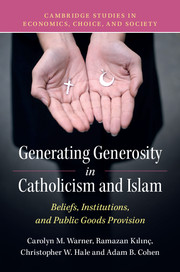Crossref Citations
This Book has been
cited by the following publications. This list is generated based on data provided by Crossref.
Herzog, Patricia Snell
2020.
The Science of Generosity.
p.
21.
Herzog, Patricia Snell
2020.
The Science of Generosity.
p.
53.
Herzog, Patricia Snell
Strohmeier, Amy
King, David P.
Khader, Rafia A.
Williams, Andrew L.
Goodwin, Jamie L.
Doan, Dana R. H.
and
Moyo, Bhekinkosi
2020.
Religiosity and Generosity: Multi-Level Approaches to Studying the Religiousness of Prosocial Actions.
Religions,
Vol. 11,
Issue. 9,
p.
446.
Herzog, Patricia Snell
2020.
The Science of Generosity.
p.
1.
Herzog, Patricia Snell
King, David P.
Khader, Rafia A.
Strohmeier, Amy
and
Williams, Andrew L.
2020.
Studying Religiosity and Spirituality: A Review of Macro, Micro, and Meso-Level Approaches.
Religions,
Vol. 11,
Issue. 9,
p.
437.
Vaughan, Kenneth R
2021.
Religious Moral Communities or Secular Tolerance? Individual-, National-, and Regional-Level Explanations for Restrictive Refugee Policy Preferences in Europe.
Sociology of Religion,
Vol. 82,
Issue. 3,
p.
305.
Gill, Anthony
2021.
The comparative endurance and efficiency of religion: a public choice perspective.
Public Choice,
Vol. 189,
Issue. 3-4,
p.
313.
Dzutsati, Valery
and
Wuthrich, F. Michael
2024.
Liberalism of religious Muslims in illiberal Muslim-majority and minority societies: evidence from Azerbaijan and Georgia.
Politics and Religion,
Vol. 17,
Issue. 4,
p.
605.



